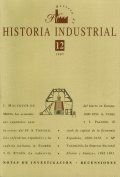The Spanish Sephardic Jews and the Italian Silk Manufacture in the Early Modern Ages
Abstract
A considerable number of the Jews who left Hispanic Kingdoms after the expulsion decree of 1492 were artisans and merchants specialized in the production and sale of silk fabrics. Their arrival in different States of Italian Peninsula contributed to the formation and achievement of a cloths manufacture (taffetas, veils and gauzes) of Spanish origin. This review emphasizes on Jews and New Christians role in working of light silk cloths in late Middle Ages iberian territories. It also examines the technical distinctive feature of their production means and finished goods to demonstrate their penetration in Italy and the continuity of that productive technology and pattern. Some Italian Princes offered protection and privileges to the sephardic immigrants, with the purpose of developing own silk industry (the Dukes of Ferrara, for example). In other cities (like Naples, Milan and Bologna) the commercial success of the new kind of cloths determined a partia1 reconversion of the local silk manufactures.
Downloads
Downloads
Published
How to Cite
Issue
Section
License
We have been applying a Creative Commons Attribution license (CC-BY) since 2019, before that year we had a partial open access policy, which included open access for the first two months after publication, followed by an embargo policy for non-subscribers, as access to the last 4 published issues was restricted to journal subscribers. In contrast, early-view articles were always open access prior to publication in an assigned volume. Until 2024 the access to the last 4 published numbers was restricted to those who were subscripted to the journal.
The author assigns all rights to the publisher. Creative Commons
The author who publishes in this journal agrees to the following terms:
- The author assigns all intellectual property rights exclusively to the publisher for the entire duration of the applicable intellectual property rights.
- The publisher will distribute the texts under the Creative Commons Attribution License, which allows others to share the work, provided that they acknowledge the authorship, its initial publication in this journal, and the conditions of the license.





